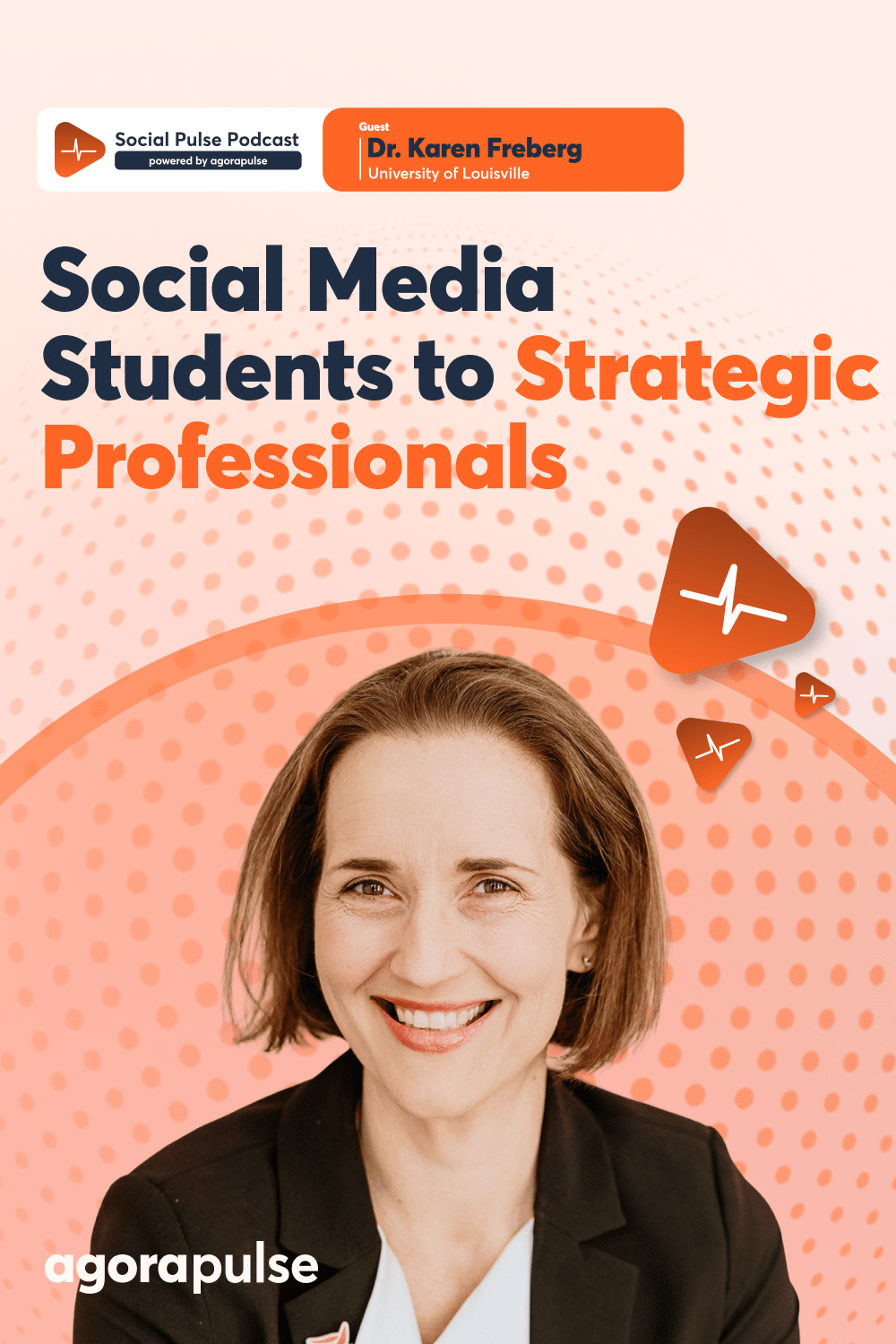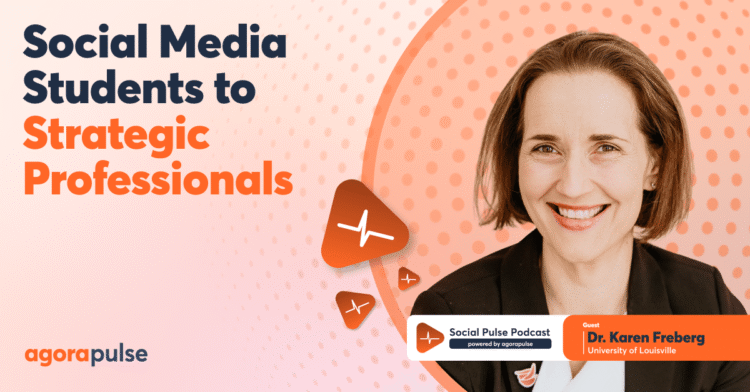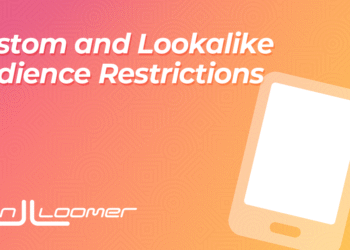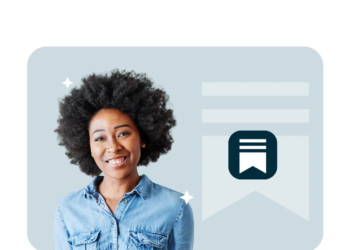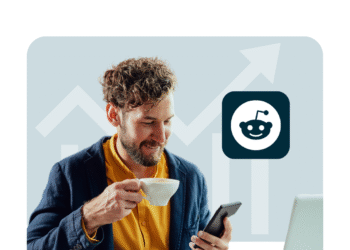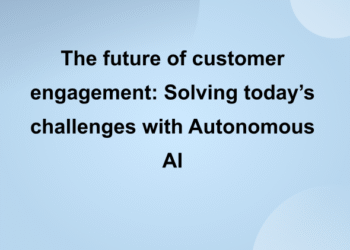Are you frustrated with the gap between what new social media hires learned in college and what they actually need to know on day one? You’re not alone. Too many graduates enter the workforce with theoretical knowledge but lack the practical skills, strategic thinking, and real-world experience that employers desperately need. They can create content but struggle with crisis management, understand algorithms but can’t tie campaigns to business objectives, and know the platforms but miss the strategic nuance that separates good social media work from great results. The disconnect between academic training and industry reality is costing businesses time, money, and missed opportunities.
That’s where our guest today comes in as the solution. Dr. Karen Freberg is a Full Professor of Strategic Communications at the University of Louisville who has spent her career building bridges between academia and industry. She’s the award-winning author of “Social Media for Strategic Communications,” has consulted with major brands like Adobe, Meta, and Hootsuite. Most importantly, she’s the director of The Bird’s Nest, the University of Louisville’s first student-run strategic communications agency where students work with real clients on real campaigns. Dr. Freberg has cracked the code on preparing students not just for their first social media job, but for long-term strategic careers that deliver measurable business impact.
Social Pulse Podcast host Mike Allton asked Dr. Freberg about:
- Bridging the skills gap. How educators can redesign social media curricula to focus on practical, industry-relevant competencies that employers actually need.
- Student agency benefits. Why hands-on client work through student-run agencies creates more job-ready graduates than traditional classroom learning alone.
- Strategic thinking development. How to teach students to think beyond content creation and develop the business acumen and crisis management skills that drive career advancement.
Learn more about Dr. Karen Freberg
Resources & Brands mentioned in this episode
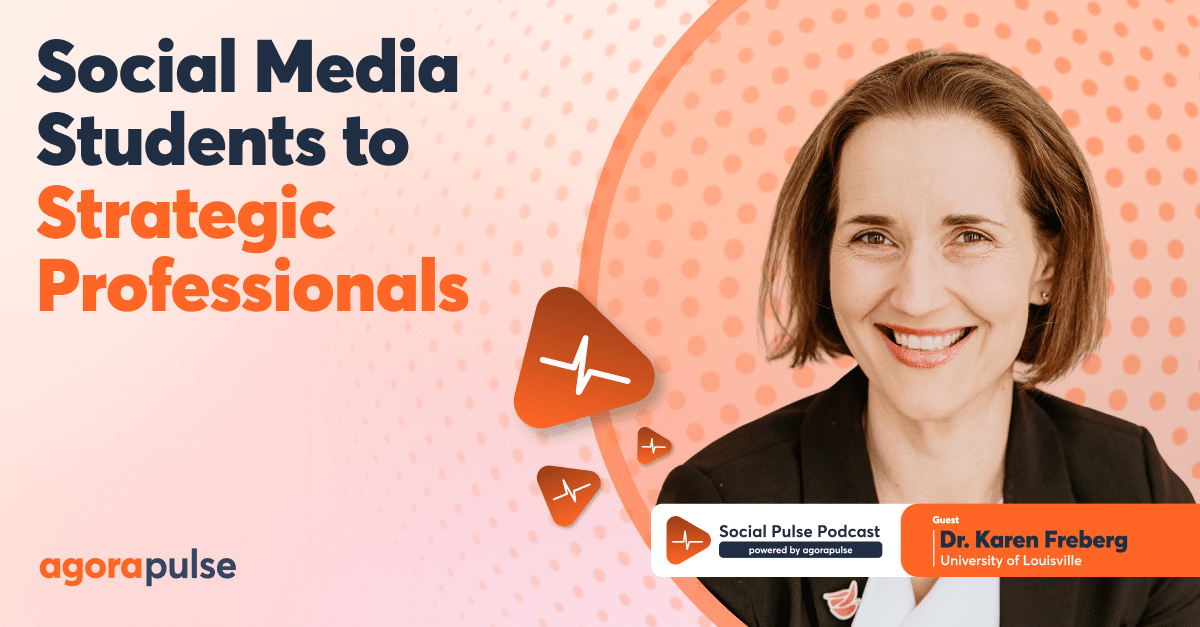
Full Transcript
(lightly edited)
Mike Allton: Welcome back to Social Pulse Podcast, where we’re digging into the challenges, successes, and stories of social media and community professionals in the industry just like you. Subscribe to gain valuable insights that you’ll be able to apply to your own work and social presence from each and every episode.
I’m wondering, are you frustrated with the gap between what new social media hires learn in college and what they actually need to know on day one? So you’re not alone. Too many graduates enter the workforce with theoretical knowledge but lack the practical skills, strategic thinking, and real-world experience that employers desperately need.
They can create content but struggle with crisis management. Understand algorithms but can’t tie campaigns to business objectives. And know the platforms, but miss the strategic nuance that separates good social media work from great results. The disconnect between academic training and industry reality is costing businesses time, money, and missed opportunities, and that’s where our guest today comes in as the solution.
Dr. Karen Freberg is a full professor of strategic communications at the University of Louisville and has spent her career building bridges between academia and industry. She’s the award-winning author of Social Media for Strategic Communications , has consulted with major brands like Adobe , Meta , and Hootsuite , and most importantly, she’s the director of The Bird’s Nest , the University of Louisville’s first student-run strategic communications agency, where students work with real clients on real campaigns. Dr. Freberg has cracked the code on preparing students, not just for their first social media job, but for long-term strategic careers that deliver measurable business impact.
Hey, Dr. Freberg, welcome to the show.
Karen Freberg: Thank you so much, Mike. It’s an honor to be here.
Mike Allton: My pleasure. I’m excited to have this conversation with you. We’ve known each other for years. This is the first chance I’ve had, though, to interview you, so it’s a particular treat for me. You’ve described yourself as a builder of bridges between industry and academia.
I wonder what specific gaps you see between what students learn in social media courses and what employers actually need?
Karen Freberg: Yeah, absolutely. That’s one of the goals that I have is to be able to bridge that gap because you do see a lot of times within classes that students understand the concepts, or they understand how to use social media for their personal uses.
But when it comes to applying these various strategies from a business sense to other companies, or how to apply the concepts that they’re learning about, into actionable situations in good times as well as some crisis situations. That’s where that disconnect is. And so the real solution to really build those bridges is, really engaged in experiential learning, like taking the students through the process of not only teaching them.
The concepts, but understanding how and why we utilize these platforms and tools to build relationships, formulate communities, utilize partnerships with creators and influencers, and also measure key outcomes that tie into business and communication objectives, and basically coming in with a holistic perspective.
And so that’s been the model that I’ve tried to use in my courses, and then also apply within the Bird’s Nest, is to give students the opportunity to. Learn the concepts, understand the strategies, look at case studies and research, but then say, okay, let’s bring in a wide range of different clients at all different levels and industries so that they have the experience to apply what they’re learning, but also really I think, ultimately create impact to make it really a win-win situation for the businesses that they’re able to get the insights and talent. Coming out of the university system, students are also able to have these stories and evidence of their work that they can then apply to future internships and jobs after they graduate.
Mike Allton: That makes a lot of sense. We’ve got a relationship with Krissy Buck , who’s an instructor at WSU Tech , and she’s using Agorapulse for a very similar purpose with her digital marketing students.
So tell us more about the Bird’s Nest. That’s your student-run strategic communications agency. Basically. How does that work? How are they working with actual real clients and approaching their social media marketing?
Karen Freberg: Yeah, absolutely. And this has honestly been a goal of mine as part of my professional development for years. And this has been something that I really wanted to build and do at the University of Louisville. And we actually officially got the green light in February of 2020. We had that little, global pandemic that happened until the green light of in. I really felt, looking at the students and looking, I tried to stay connected to my friends in the industry, and I was talking to them about what they are looking for new hires, and a lot of ’em said, we need experience, we need students who have evidence of actually of having their ideas actually work and the work that they’ve been able to do that has really been impactful for these businesses and organizations, nonprofits, etc. So really the agency was really about providing students an opportunity at the University of Louisville to apply what they were learning in the classroom.
And my goal has always been to say, okay, what can I do to best prepare students for the future? And identifying like ways in which the business could fit in those gaps in skills and experience that then by the time they graduate, they’ll be very remarkable. So we officially launched and fall 22, and we had four students of our four founding members who really solidified the culture, the branding, and the overall essence of the student agency and this upcoming fall.
We’re gonna have over 60 students. And so it’s gone rapidly in a span of QuickTime. I’m honestly, Mike, I thought if I had 20 students, I’d be like, oh my God, I’m so like in a good zone. And now I’m like, wow, okay. I was over 60, so that means more coffee for me. But it just shows that there is something that students are craving, but also the interest in what we’re doing. And so, working with companies and brands, we work in a wide range of different industries. And so from large to small, we work with some startups and nonprofits, and then some corporations and businesses. And so one of our clients that has been with us from the very beginning is Churchill Downs, and they do that little horse race that happened for Saturday and May. So they’ve been the Churchill Downs team has been absolutely fantastic. So we’ve had a chance to work with them on the Kentucky Derby in a variety of different ways, helping out with the social media team, but then also the red carpet team. As well, the students really get that global premier sporting event experience that they can put down on their resume.
But we’ve also helped them out with certain initiatives like starting a student ambassador program. But also they have a fall season that they do with fall races. And so they actually have theme days and so we help them out last year in creating their college day event. Which was part focused on targeting not only University of Louisville students, but university students in the region to come in and experience their Churchill Downs races with scholarships.
And it’s a great way of working with their large corporate brand in multiple ways. So, the students, every semester, get a chance to work on a couple of clients. And it gives them that experience not only working on real projects that they get to see out in the field. In the workplace and they’re able and for the world to see.
Sometimes, in the case of the Kentucky Derby, millions of people are watching what they’re posting on social. It’s also giving them insights in terms of how to work and be professional on the job. Networking with fellow professionals, learning the ropes of the behind-the-scenes of what is working, what is not.
And being able to build that experience and that confidence to be able to work on and offline in different capacities. And so by the time that the students graduate, they feel more confident, more professional, but also they’re able to have that level of experience that they can talk about with future employers.
And so the one stat that I’m particularly proud of, Mike, that in just the three years that we’ve been going forward, and I hope to continue on this, for the future, is that we have about a hundred percent employment rate. With our students. And so the talent that we’re trying to cultivate, tying in the curriculum, tying in the client work building that, again, that bridge between academia and industry, I think is a, and also community engagement and like working within the community is like a rifecta of really a great model that I hope and I’m trying to, share with other universities that they could look at as a model to really prepare students for the workplace.
Mike Allton: That’s amazing. Kudos to you for starting that, for having such an incredible hiring rate for your students. And I love the fact that you brought in a well-known brand because you can’t say enough about social proof, right? I can go to a potential employer and say, I did the social media for Joe’s Garage and okay.
Cool. But I’ve worked on social media for the Kentucky Derby. That just speaks volumes. Yeah. So that’s amazing. And if I’m understanding correctly, this is essentially a fully functioning digital marketing agency.
Karen Freberg: Yeah, it’s very much,
Mike Allton: I was just gonna say the logistics are what I really wanna know about right off the bat …
Karen Freberg: Yeah. I mean it is, I’m basically there, but like the way in terms of the organizational structure that works is I want also, like within the agency, I want to give students that internal like leadership, virtualism, and teamwork experience. One of the things we did before we officially launched in the fall of ’22 was that summer I tasked these four students who were part of the founding. And I basically posed them, like my only creative brief for them for building the student agency was one I wanted to feel like students really were the ones who built this. I didn’t want it to be just me, like I haven’t, my experience in academia, I have my consulting experience, but I really like, one of the issues that I do see a lot of times with student agencies is you’re like, yeah, it’s a student run agency, but it’s run by professors.
Like you really get that lens and. So I told the students, I want you to research all of these different student agencies to see what works, what doesn’t what, and then do a situational analysis. So that’s the kind of thinking about what your takeaways are, what are things that you like that people have done?
So we looked at some of the award-winning and student agencies that are at various universities, and the students came back and they said they wanted to change the organizational structure, ’cause it was very top down, where you had all the professors and then basically the students were at entry level.
And I wanted to give students that leadership experience. And so we actually have six directors. And basically, I modeled it like, almost, I was reading Camelo at the time, so I was like, oh, King Arthur’s core, like everyone has an equal seat at the table. And so I’m technically the director and yes, faculty director.
And so I do have oversight. But I wanted the students who were directors to have ownership of their role, and that they had that confidence in leading their teams, but also that title within the agency. And so they had all these different titles associated with it. But then they also said, this is, and one student, actually, a year later, classified our agency.
She’s most of the other agencies were like the Avengers team, but she’s we’re more like the Guardians of the Galaxy. We’re coming in from different backgrounds. People might look at us as gritty, but we get the job done. And we have used that as our brand identity.
So the students really they come up, came up with the organizational structure, but also the brand identity. So what I try to do is handle it like bureaucracy, like paperwork scheduling for students in the curriculum. But also like I oversee the internships and practicums that are associated with the agency.
I work with clients for scope work, so I do the leadership kind of roles in that regard. But the students, like the directors, meet with their teams, they have deliverables, they have, they have to make sure that everyone gets everything done by certain deadlines, and so it gives them that.
Power and ownership. It also applies the notion that yes, group projects don’t lead. You know that they don’t end after college, which is sometimes a surprising lesson for some of the students. Oh my God, I thought group projects were done. I’m like, no. You do pause group projects in life.
Mike Allton: Yes, you do. And all the same dynamics continue. The good and the bad.
Karen Freberg: I am amused I do, I get amused with my students, ’cause my some of my directors and team leads are like, Dr. Freberg, this team member left me on read on the text message. They didn’t respond immediately. And I get emails, too, from students about, basically, why didn’t you answer this email?
And I’m like you feel it like at 3:00 AM, I’m sleeping, but I sit back with my cup of coffee, and I’m like, and then they put things in perspective. It’s oh, this is what you were talking about with us emailing, and yeah, like we don’t expect an immediate response, and we have to do this.
I’m like, yeah. Yeah. So it’s good lessons in professionalism and leadership that they’re also getting along the way.
Mike Allton: Yeah, obviously, the bulk of this conversation we’re talking about social media skills, but I just love, I can’t stress that enough, how much beyond that you’re teaching your students and they’re learning through their experiences there is, they’re carrying so much forward into other careers.
And just as a quick aside for folks who aren’t aware. The Bird’s Nest to me has this great, obviously visual analogy. It’s a natural, the little birds, little fledglings are gonna sprout their wings and go off and fly. But it also comes from the Louisville Cardinals, the mascot of the university.
So that’s where that comes from, folks. But you mentioned that you do consulting. I mentioned that you do consulting as well. I know when you’re talking to brands like Adobe, Mata, I’m wondering what skills do you see in successful social media professionals that are often maybe missing in some of the recent graduates?
Karen Freberg: Yeah, I mean I think that there’s a lot of, like, elements that you do see that are somewhat, I think, to put it up front first. I think there are a lot of skills that some of the students who are graduating do have, that are basically present across the board.
But I think some of the skills that I do see missing need to be emphasized a little bit more. And I’m in communications and so I think. The recent graduates are communicating, but in the mediums that they are most comfortable with. And like texting, email, et cetera. But one of the things that I’ve been noticing is that when it comes to, let’s say, having a face-to-face conversation, they get really nervous, or, God forbid, you have to make a phone call.
And so I talk to professionals in the industry, and then they say, yeah, communicating in person, talking on the phone, and empathy being an agile and adaptive, like not having everything so scripted. So I take that kinds of gaps basically.
And I thought, and thinking to myself, and this is, I guess, my background also in crisis communications. I’m like, okay, we have this crisis going on in terms of hiring expectations. How do we fix that? I always want to see what strategies we can do. So I’ve tried to build that into the application process.
Within the Bird’s nest and even in my classes, where they have to do interviews in person, not virtually in person, to apply for the Bird’s nest. And so they get those interactions. And so the first round is basically with our team that does human resources, ’cause we have a lot of students who want to go into that particular field after graduation.
So it gives the students opportunities to be interviewed, but it also, for the students who are doing the interviews, they get to sense like, oh, I’m hiring for someone. Who do I want on our team? What are the skills that they have? What are the things that are missing? Now, oh my gosh, we gotta bring this person on ASAP.
So some of the gaps that I do see that related to adaptability, agility empathy. And then just face-to-face communication. I’ve tried to incorporate those lessons within kind of the culture of the bird’s nest, whether it’s in our meetings, in our correspondence. And I feel, too, Mike, it’s very important for students, especially, to learn by example.
And I try to inspect what I expect. So if I’m expecting them to address these various gaps, the skills that are missing. From new graduates, I need to basically incorporate and let them know, okay, these are the things that I’m going to be looking for. And I’m also practicing these as well.
I’m communicating in person, I’m being, I’m expressing empathy. I’m also trying to be adaptive and agile and just basically say, this is one of the types of behavior and time of interactions that I’m looking for that will help you be successful as you move forward in the industry.
Mike Allton: So insightful. Now, I mentioned at the outset that you’ve got an incredible book, so incredible. It won an Apex Award for excellence. So I’m wondering if you could talk a little bit about that. What core principles do you think that every other social media curriculum should include to prepare these kinds of students for the strategic roles that they’re moving into going forward?
Karen Freberg: Yeah, so I wrote a book, gosh, it seems like it was yesterday, but it wasn’t. My first edition was back in 2018, and the core competencies, I feel, a lot of times, the one thing that I wanted to focus on for this book is, there were lots of books written ahead of time, but I felt like Goldie walks on honestly.
I was like, these are so focused on theory, or these are out of day or to, or focus on the, like the surface level skills. I wanted a book that kind of really gave a blueprint in terms of how and why we utilize these tools from a strategic lens. And I feel too, in social media, the tools are gonna change.
But human behavior doesn’t. And I guess this is coming from me, like my mom, who’s the original Dr. Freberg, I call it the OG, Dr. Freberg, I’m just a social media edition. She’s a psychologist. And so she’s yeah, what you’re doing here is applied social psychology. And I’m like, yeah, basically.
And so I try to incorporate some best practices within the book, tying into some of the current cases that we’re seeing, the tools, and Agorapulse is listed as a must-try of course, in my books, and I’m going to have my third edition actually coming out in August.
But it’s really important to look at how and why we use these tools. And some tools, and so trends are gonna come so fast, but like understanding the principles of building good relationships.How do you foster a strong community? How do you navigate cancel culture?
If you have individuals who are really adamant about sparking outrage. Can you restore those relationships effectively? And how do you really practice influencing and creating relationships and marketing in a way that really drives business objectives, not just, oh, we’re a Kardashian, we’re gonna post an image, and then the rest is history.
So I try to incorporate, more strategic lens but also being creative as well. So I try to. Tap into the research elements of being strategic and using insights to drive the creativity, but also. When it comes to creativity, not being limited, just with oh, this is the only way we can go about and do it, and really think big.
And it’s been fun to look at the different cases, look at what people have done. It’s been fun to be able to highlight some of the work that my friends have done in the industry and interview people, for the book to show students. There are also humans behind each of these brands, and at the end of the day, we’re interacting and talking to other human beings on social, because social media is the first and foremost social.
Mike Allton: Oh, I couldn’t agree more. Apparently, you, me, and your mother need to have a fantastic conversation, a whole other interview just about social psychology, ’cause we can geek out about that. But folks, we’re talking with Dr. Karen Freberg about how you should be thinking about how you approach social media marketing education.
In your universities, in your curriculum, with your students helping to prepare them for the coming days of marking. But before we go any further, I want to share with you a quick video about how Agorapulse is helping students and marketers around the world. Save time.
Advert: When I take a look at the biggest core benefit for Agorapulse, I have to look at two sides of the equation. I have to look at what it does for us as far as managing our community and all of the conversation management tools, which I appreciate so much, but from a far more pragmatic point of view, it saves us money.
It saves us a lot of money because of the productivity the features that are built in with how it manages those conversations. We don’t waste time. We’re efficient.
Agorapulse allows me to get through all my messages and my replies really quickly. That’s probably the number one reason for me wanting to use the tool. It saves so much time.
A big draw for me with Agorapulse was the ability to manage my YouTube comments. This is a huge feature for me. And here’s why, because up until then, I basically would have to go into my social media manager system to do everything there.
And then I’d have to log out, go back into YouTube and do the same thing there. Now when you are managing multiple clients. This becomes a huge waste of time, right? And what we want to do is streamline that efficiency so we can log into one website. Now we can manage all of our major social profiles there, and we’re able to serve our clients with more clarity and purpose.
They worked with us, they helped train us on how to get everything up and going, and we were able to cancel out all the other tools that. We didn’t eat anymore, so it saved us a lot of time and a lot of headaches for my team members as they’re, now they only have one tool that they can maximize their clients in.
Mike Allton: So we just barely touched on crisis communications, and I feel like that’s a huge part of your expertise. I’m wondering how you prepare students for that kind of thing when. These social media disasters they’re inevitable. They come up, and I know it’s really hard to capture that in a textbook. How do you prepare them?
Karen Freberg: That’s a great question, Mike, because I think students feel, they’re very passionate and interested in crisis communication, but when it comes to the spotlight being on them in a crisis, you’re like, wait, what? What do I do? And I think I actually teach PR and crisis class at the University of Louisville.
It’s a graduate-level course, and so a lot of my students who are interested in PR and crisis take that class. And so one of the assignments I actually give them is a simulation exercise where they actually have to work in a team to prepare for a scenario, and I throw a few wrenches.
More like a bag wrenches, through the process, to show that a crisis is not linear. Like things happen, and all over the place. And so it gives ’em that hands-on experience. So then they know, one, how would they handle the situation themselves, but also what would they do if they had a team in place that may or may not necessarily be as prepared as they should be, but. I think simulations really give students an opportunity to look at what things are that they would do differently if this were a real situation, and give them the confidence that if they were able to navigate this effectively, they’re like, okay, I could handle this situation.
And I’ve always. Also, try to bring in a lot of the experiences that I’ve been a part of, because one of the areas where I do some consulting is crisis communication. So I’ve had a chance to look at large scales and then smaller. And then there have been times when I tell my students, yeah, there are a lot of things you don’t necessarily have on your Bingo card that you would think that you would have to address, but you’re like, now I do. So there have been a lot of use cases that I’ve been able to bring in, but then I try to bring in guest speakers who’ve talked about some of the crises that they’ve been a part of.
Some have been big, and some have been like, really, impactful and well-known. And so it gives the students that kind of experience, like an experiential learning aspect, but also ties in. Really, evidence-based practices that we try to incorporate into our curriculum, at least in my classes.
And that brings in the insights from case studies, the real-life stories from industry professionals. But then it gives the students their own experiences. So it’s basically a comprehensive experience. And I think you can learn a lot from a textbook, but sometimes, I’m a textbook author, there are still things that are like.
I know, this is not in the textbook. This is real life. That you have to learn and adapt, and I think you want to have that comprehensive experience to be able to navigate and be most prepared accordingly.
Mike Allton: That’s so smart. I actually come from an IT background, and so when I was working with Dana Corporation, Northern Ohio, a couple of decades ago, we’d have disaster preparedness exercises, which would be very similar.
We created this because I worked in the global IT department, so we had massive server rooms, and then created a scenario where everyone had to come in on a Saturday and discover that. Oh, it snowed overnight, which it does in northern Ohio. And the snow piled up so deep that the roof of the server room collapsed.
And these X five systems are now totally offline. What are you gonna do? And you’d have to figure that out and have as much documented as you can for certain scenarios, and yeah. I love that you’re throwing wrenches in there. I could just imagine you telling a, you’ve got a customer support nightmare happening on X, and you gotta deal with it in the middle of it. Oh, by the way, the CEO decided to go out and put a message out. Without talking to you. Yeah. What do
Karen Freberg: Yeah, I love throwing wrenches, and I tell my students there’s a purpose to my madness. And then afterwards they gimme this look like Dr. Freberg, what did you do? And I’m like, trust me, you’re gonna be okay. If you’re. In a kind of crisis situation, for real, and you’re prepared, you’re going to thank me for this. But I also try to take it like a coach approach. I have a background in athletics, being a student athlete in college and high school, and in track.
And I feel like it’s important to give students context, okay, this is why we did this scenario. These are the skills that I’m looking for you guys to bring to the table from this experience. But I’ve also every year I changed up the scenario and it’s usually because of an experience that I’ve had or experienced on the consulting side or in other capacities.
And so I also try to make it relatable that the students would be like, okay, I need to go down the rabbit hole and find out if this actually happened. And fun fact, there’s actually a case that I wrote about in my textbook. It’s a legal case. But it really tapped into the ownership of your personal brand.
And I provided the students with a scenario saying, okay, you represent a personal, basically a client who has their personal brand, they built it up into an influencer kind of status, but their employer wants to basically take ownership of their personal brand and sue them. For ownership, what do you do?
And then there are a few monkey wrenches along the way. But that was actually a, situation that was sparked an inspiration by a case that I was a part of as an expert witness. And so it’s, it was very fascinating for the students. They went on the whole deep dive, afterwards, oh my gosh, I need to learn more about this.
But it is important to give students at different levels of experience. A lot of times, when you think of crisis, you think of scandal, natural disaster, but it could be different types of crises. You need to be aware. And I tell them like, Hey, murder hornets happened in 2020. You gotta be prepared for that.
So you just never know what’s going to happen and being thrown in your path. So you need to be adaptive and agile to be mindful, there’s gonna be some universal practices that will always be important, but you need to be able to adjust depending on the situation and circumstances.
Mike Allton: Yeah, and the sports analogy is so apt because, like an athlete who needs to develop muscle memory for doing the kinds of tasks so that they don’t have to think about running a layup, they can just do it and process the variables. It’s the same thing in this kind of scenario. There’s no muscle memory unless you count the brain, but it’s that history.
Karen Freberg: And that planning and preparation, I tell students, like in times of a crisis, you can’t, you don’t want to develop a crisis plan in the midst of a crisis. You wanna do everything like you can before hand. And it’s an athlete you’re not gonna say, oh, the day before the Olympic trials, I’m like, I’m gonna start training for the Olympics.
No, that’s years of preparation that you have to do. But yeah, like you don’t necessarily want to do all of that at all at once at a time of crisis.
Mike Allton: Yeah. So I know some of these students, they’ve gone on to work with major brands, with huge agencies. What do you think separates the students who excel in their careers from those who might struggle in advance?
Karen Freberg: Yeah. And I actually think it’s funny that you know that you asked that Mike, because it literally I think our brains were like aligned today, because I literally had a conversation with a professional over coffee this morning about this. ‘Cause she asked me like, what are things that you see differently, from students that you’re interacting with versus others? ’cause she hears that a lot of employers are like, yeah, students are not this, that, whatever. And. I feel that the students who are very successful, first and foremost, are driven. Honestly like, they have a game plan in place. They’re like, you know what? I have a goal in mind. I have places that I want to be.
I have a direction in my career path. Like I have a roadmap in terms of where I want to go, and what I want to do. And they know in order to do that, they have to set various realistic objectives and goals for themselves in terms of reaching that. And they’re not afraid to put in the extra work for that.
And so for me as a professor, and then looking at this also from a former student athlete’s perspective, like the willingness to be a student of the field and profession, but also working towards that every day, is inspiring for me. That tells me a lot about their commitment to work. And so I think some of the students who think, oh, I’m gonna be fine with just a college degree, that’s not gonna be as exciting as if you have a student that’s not only has a college degree, but they have this wealth of experience that they’ve taken the initiative not only to basically get as much experience they have.
They are able to network within the community. They’ve developed a personal brand that is both positive online and offline, and they’ve really developed this holistic skillset that is adaptive to the growing changes that are happening in the industry, and they’re willing to be a lifelong learner beyond just the classroom.
So I feel that some of those students who have really excelled have really provided like almost like a new mindset of being agile and adaptive, empathetic. Definitely a lifelong learner and willing to hit the ground running and invest in their learning both professionally and personally to really be the best version of themselves.
And so I think those are just some things that. I’ve seen that students who’ve been successful after graduation have been really able to navigate that. But then the students who have struggled may not have taken advantage of some of the opportunities that they have in college to study abroad, to be part of agencies, or organizations like the Bird’s Nest.
And so they’re adding disadvantage to students who are doing those things to more employers.
Mike Allton: I couldn’t agree more. I’m old enough that, okay, this was not an option when I was in college studying this kind of thing. I studied it, like I mentioned, and the history of all things.
And I learned as I went, a couple of decades ago, how social media works, how to achieve success, and so on. And I know the appeal of leaning on vanity metrics. I know how great it looks when a post goes viral, gets tons of likes and engagement, and that sort of thing. But I’m wondering in your mind, how do you define success when it comes to social media, and how do you help students tie that work to actual meaningful business outcomes?
Karen Freberg: Yeah. Oh absolutely. And I actually have a great case from that that happened last year. So, as I mentioned earlier, one of the clients that we do a lot of work with is Churchill Downs . And so last year, for their Kentucky Derby , it was a big milestone event. It was on their 150th, and they came to the Bird’s Nest.
Really, and this is one thing that I think is really valuable for brands to interact with organizations like student agencies, is that you really get a living, breathing focus group of the people that you want to target and reach. And so it’s basically an opportunity for them to ask questions.
So their goal for the Kentucky Derby it’s if anyone has had a chance to go, it is iconic, it’s awesome, but it’s also on a lot of people’s bucket lists. But one of the goals that they had for this milestone is to celebrate not only the 150th, but also the next 150. Like, how do we really become the place for entertainment and experience, at this iconic premier global sporting event, and really, how do we rejuvenate and grow our millennial and Gen Z audiences?
So the younger audience was definitely a target for them. And they came to The Bird’s Nest. And they asked the students, like, okay, if we brought in creators, if we brought in influencers, are there any individuals that you feel would be exciting? That people would be like, yeah, I need to go to the Derby because of this.
And so my students said, well, of course, they mentioned two names. One was of course, Alex Cooper from Call Her Daddy, and then Alix Earle from TikTok . And so both of them at the time, because they were a part of the Unwell Network came to the Derby, and they actually had several activations going, and it just created a huge viral social media storm for the Derby.
But in terms of metrics, as you said, Mike, it’s important. Like one of the things that really was important for Churchill Downs is they looked at their audience growth across social media channels and they noticed that they increased their social media presence, like across the board, by 700%, which is pretty big.
But particularly within the millennial and Gen Z audience, they grew exponentially. But what was important is what we look at; what I look at is the behavioral metrics. It’s like how many people said, because they saw Alix Earle and Alex Cooper at the Derby, that they’re planning to go to the Derby next year, and they saw a huge level of signups for their email newsletters.
They got, oh yeah, a ton of people saying, yeah, I want to sign up to find out more information about ticket prices. So they looked at those metrics based on tying in what the strategy was of bringing these influencers in and how that drove the conversions of interest, at a fan base.
And so they actually, I think it was Alix Earle, that really was the primary driver for a lot of people. And she came again this year, and she was part of the fashion show for the Kentucky Oaks. And so you’re building that relationship and kind of building out that camaraderie. And so, even this year, they had a ton of creators on the red carpet.
And so it was a lot of fun for my students to be able to experience that and see that in person.
Mike Allton: That’s fascinating. And I’ll tell you the next time you talk to Churchill Downs, tell them you’ve influenced an audience, ’cause I definitely want to go next year. Now you describe it.
Karen Freberg: They actually want to do more with podcasting, and they actually, like one of my students who’s now Jake, her name is JC Wills, she’s amazing. A rockstar, one of the founding members of The Birds Nest. She’s now the social media manager for our Mayor in Louisville . And she came up with this deck; she called it Podcast Paddock. And so bringing in podcasters here. So there might be something. There might be something here, Mike. We need to do that.
Mike Allton: Yeah. Yeah. So, for all the social media educators and the listening professionals, what resources do you recommend? Podcasts, blogs, industry connections, and community. I definitely want you to talk about your community. Do you recommend that to them?
Karen Freberg: We are getting resources that Agorapulse has provided. I live on your guys’ blog , and I feel like so many social media resources and professionals share so many good insights. I definitely tell my educators that there are certain key people whom I definitely recommend. And so we do I actually have a community on Facebook called the Social Media Professors Group , and that actually came from a research study because there were a lot, I was interviewing professors who were teaching social media and one of them was like, I really wish there was a community where we, all of the social media professors could come together and talk and share resources and I’m like light bulb. Okay. So we have this group on Facebook. It’s gonna be, gosh, it was developed in 2016, so it’s nine, it’s gonna be nine years this October, which is crazy. But we have over 2300 members worldwide.
So it’s really been a great community. So that’s definitely one. And everyone’s willing to share resources, and that’s the culture that I’ve wanted to build within that community, ’cause. Honestly, sometimes professors don’t share the resources with others. They keep ’em to themselves. And I literally wanted to foster this camaraderie.
Because in my opinion, if we’re all able to help our students and help grow the profession that way, it’s a win. So, if there’s a really generous sharing and then I also suggest newsletters. I am a big fan of Lia, In Case You Missed It, I feel what I like about what she does on the creator social media side, she really taps into the industry, but she also teaches at UCLA , and I tell her, I love what you’re doing. I am a USC grad, but my parents did go to UCLA, so college rival raised, but she’s awesome. And then in terms of podcasts, I love Jason Fall’s Win Influence Podcast and his books, and then Mark Schafer’s books.
So I try to incorporate, so actually Jason teaches an influential strategy course for us at the University of Louisville, and then Mark also teaches at Red Curves. And so I try to advocate, all of these different resources for professors to, again, try to build in the industry component within the education part. And so you’re really able to, again, bridge the gap between industry and academia.
Mike Allton: I love this. This is fantastic. Your community is terrific. I’ve been in there for years. I’ve connected with professors, I’ve guest lectured to folks cause they put me in the community, UNC , and so on. I appreciate that, Dr. Freberg, you’ve been absolutely amazing. This has been such an insightful interview and such a pleasure to chat with you. For folks who maybe they want to learn more or want to connect with you and ask questions, where should they go?
Karen Freberg: I’m pretty much. Everywhere on social media. So I’m pretty active on LinkedIn, so just searched Karen Freberg and I’m there. And then I’d love to connect, and I’m on X , Facebook, Instagram, TikTok, which always surprises my students. And I’m like I am a social media professor, so I have on social media, but yeah, I’m pretty much everywhere. And then I’m also available through email at karen.freberg@louisville.edu and and then if you’re interested in seeing what The Bird’s Nest is up to, we’re on LinkedIn as well under a page called the Bird’s Nest Student Agency .And then we’re on TikTok and Instagram at The Bird’s Nest Loop. So if you want to see what the students are doing and what projects they’re working on, you can connect with the students there.
Mike Allton: That’s fabulous. Thank you so much. Thanks to all of you for listening. That’s all the time we’ve got for today, friends. But don’t forget to find the Social Pulse podcast on Apple. Drop us a review. We’d love to know what you think. And please join our exclusive community on Facebook, Social Pulse Community, and network with our podcast guest, Dr. Karen Freberg, other social media pros, and gain access to helpful resources. You’ll find the link in the show notes or just search the Social Pulse Community on Facebook. Until next time.
